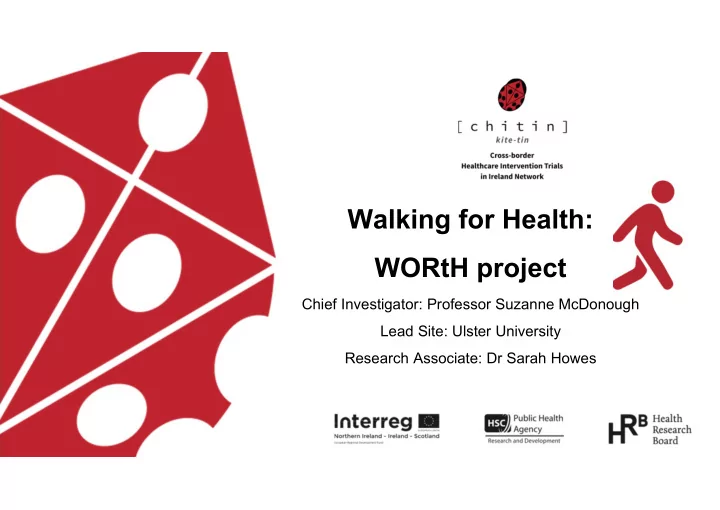

Walking for Health: WORtH project Chief Investigator: Professor Suzanne McDonough Lead Site: Ulster University Research Associate: Dr Sarah Howes
Plan • Background • Intervention outline • Progress and ongoing work
Background • WORtH project: The feasibility of a walking intervention to increase activity and reduce sedentary behaviour in people with severe mental illness • What is severe mental illness? • Why do we need this intervention?
Background What is severe mental illness? “The phrase severe mental illness (SMI) refers to people with psychological problems that are often so debilitating that their ability to engage in functional and occupational activities is severely impaired.”
Why do we need this intervention? • People with SMI have increased risk of physical health problems. • Risk of obesity, diabetes and cardiovascular disease is 1.4-2 times higher in people with mental health difficulties than those without. • Impact on co-morbidity/multi- morbidity, life expectancy and burden of mental illness across the lifespan.
• To reduce health inequality, there is a need to reduce the prevalence of long term health conditions. • Lifestyle factors, such as physical inactivity , are modifiable risk factors associated with cardiometabolic disease and other aspects of physical health.
Why is sitting less and moving more so important…..? “if it were a drug……it would be described as a miracle cure" UK Chief Medical Officers’ Physical Activity Guidelines (2019)
Move more: At least 150 minutes per week Sit less: Break up sitting time during the day UK Chief Medical Officers’ Physical Activity Guidelines (2019)
Up to 70% of adults with SMI are not meeting physical activity guidelines. Many spend up to 11 hours per day sedentary. (Matthews et al. 2018; Vancamfort, Firth et al. 2017) UK Chief Medical Officers’ Physical Activity Guidelines (2019)
150 minutes MVPA Health Benefits Exercise Dose UK Chief Medical Officers’ Physical Activity Guidelines (2019)
WORtH intervention Aim: To test the feasibility of a health coaching intervention aimed at increasing physical activity and reducing sedentary behaviour in people with SMI living in rural and semi-rural locations. Objectives: • Assess recruitment, retention and adherence • Evaluate acceptability (safety, satisfaction) • Explore change in clinical markers • Process evaluation
WORtH Randomised Controlled Trial intervention Northern & Western County Louth Mental HSC Trusts (NI) Health Services (ROI) Participant selection & recruitment (30 each site) A diagnosis of a SMI; Inactive (GPPAQ); No significant movement impairment; understand English; able to provide informed consent. Intervention group (30) Control group (30) 13 weeks •Educational group session •Face to face meeting with •Use a pedometer & step brief written information on diary PA benefits & walking •Group walk (weekly) routes •Coaching meeting (fortnightly) Outcomes •Recruitment, retention & adherence rates •Adverse events •Effect size used to estimate a sample size required for trial •Clinical markers
- Group education session Information on the health benefits of moving more and sitting less and how to be more active - Activity tracker and diary To self-monitor daily activity levels - Coaching visits (fortnightly) Set, review and progress “move more” and “sit less” goals Action planning, including overcoming barriers - Group walk (weekly) To provide an element of social support
• Information on health and emotional Group education consequences (5.1, 5.6) session • Instruction how to perform behaviour (4.1) • Problem solving (1.2) • Prompts/cues (7.1) Activity tracker • Self-monitoring of behaviour (2.3) and diary • Feedback on behaviour (2.2) • Social support from coach who is a credible source (3.1, 9.1) Coaching visits • Setting and reviewing behaviour goals (1.1, 1.5, 8.7) • Action planning (1.4) • Social support (3.1) Group walks • Practice and generalisation of target behaviour (8.1, 8.6)
Outcomes of interest Feasibility Recruitment, retention & adherence rates Safety Adverse events Acceptability Semi-structured interviews with participants and clinicians Explore Physical activity and sedentary time. clinical Body composition, functional mobility, markers quality of life, wellbeing Process Intervention components, behaviour evaluation change techniques Fidelity
Initial feedback On the Mi Band: “Initially was worried “I thought it was very good. On the group walk: “It felt good about distance, but It could tell all the footsteps walking with them. Because happy to now. Feel you were doing during the you can talk while you are good I can manage day and that. It was very walking. It feels good when more steps.” interesting to wear it and do people are walking with you it, you know.” and that.” On the coaching visits: “The more steps I was taking “Setting a goal was useful. It every day, I was feeling better was helpful to have someone for doing it and all that” to help.”
Plan • Background • Intervention outline • Progress and ongoing work
Progress to date • Development of a training package including manual for trial delivery • Pilot phase completed at one study site (complete; n=9 recruited) • Feedback from participants and clinicians used to inform development of the intervention and clinician training • Awaiting approval to start recruitment in NI
Ongoing work • Approval for all 3 study sites • Clinician training ongoing • 6 phases (2 at each site) • Findings to inform a main trial
WORtH team Academic Partners Ulster University (lead) Prof Suzanne McDonough (CI) Prof Marie Murphy Prof Mark Tully Edinburgh University Dr Ailsa Niven King’s College London Dr Julie Williams Queen’s University Dr Tony O’Neill Belfast Dr Iseult Wilson University College Dublin Prof Mary Clarke Clinical Partners Louth HSE Dr Catherine McDonough Mr Maurice Dillon Ms Duana McArdle NHSCT Dr Judy McAuley WHSCT Dr John Brady Trial Steering King’s College London Dr Brendon Stubbs Committee Dr Fiona Gaughran Dr David Shiers
Thank you to all the WORtH participants, clinicians and collaborators.
Recommend
More recommend